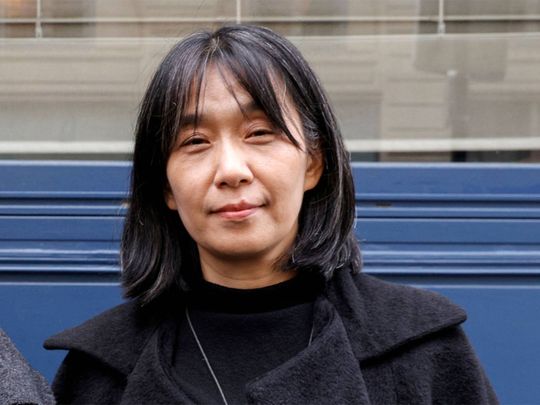
In a momentous announcement that has reverberated throughout the literary world, South Korean author Han Kang has been awarded the 2024 Nobel Prize in Literature. Renowned for her hauntingly beautiful prose and deep exploration of the human psyche, Han’s work has resonated with readers and critics alike, solidifying her status as one of the most significant voices in contemporary literature.
Born in 1970 in Gwangju, Han’s literary journey gained international acclaim with her groundbreaking novel The Vegetarian, which received the Man Booker International Prize in 2016.
The novel’s unsettling exploration of societal norms and personal agency captivated a global audience, establishing Han as a powerful storyteller unafraid to tackle complex themes. Her subsequent works, including Human Acts and The White Book, further showcase her ability to meld poetic language with poignant reflections on trauma, loss, and resilience.
The Nobel Committee praised Han for her “intense poetic prose that confronts historical traumas and exposes the fragility of human life.”
Confront realities
Her writing often grapples with historical contexts, particularly the lingering effects of South Korea’s past, allowing her to delve into universal themes of suffering and healing. Critics have lauded her for transforming personal narratives into collective experiences, inviting readers to confront their own realities.
The announcement of her win has been met with widespread acclaim, with many viewing it as a pivotal moment for Asian literature on the global stage. Han Kang’s recognition serves as a testament to the power of diverse voices in literature and challenges readers to engage with stories that reflect the complexities of our shared humanity.
Translations of Han Kang’s novels have made her voice accessible to readers worldwide, amplifying her impact across cultures. Her ability to weave intricate narratives that resonate deeply on both personal and universal levels has garnered her a loyal following and critical admiration.
In her first response to the award, Han expressed gratitude and humility, stating, “I am honoured and I really appreciate your support, the support of the prize,” and “I grew up with Korean literature, which I feel very close to, so I hope this news is nice for Korean literature readers.”
She also reflected on being the first South Korean literature laureate, noting how the collective efforts of fellow writers have inspired her: “All their efforts and strengths have been my inspiration.” Celebrating the win, she shared a quiet moment with her son over a cup of tea.
As the literary community comes together to celebrate this achievement, anticipation builds for Han Kang’s future works. With this Nobel Prize, she not only cements her legacy as a literary luminary but also inspires a new generation of writers to explore the depths of human experience through their own unique lenses.
In her hands, literature remains a vital tool for connection and reflection, transcending borders and inviting us all to engage with the world around us.
— Maram Saleh, a Bahraini law student, finds inspiration in the realms of research and writing










